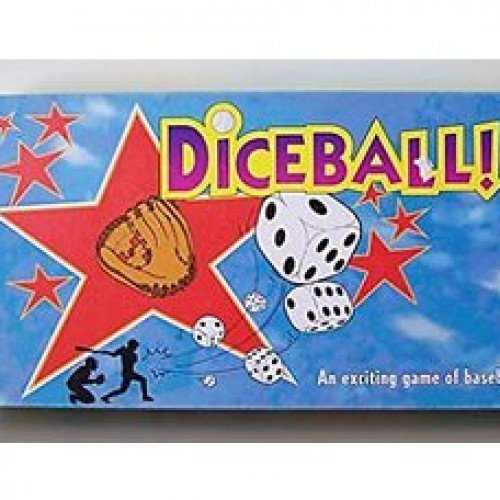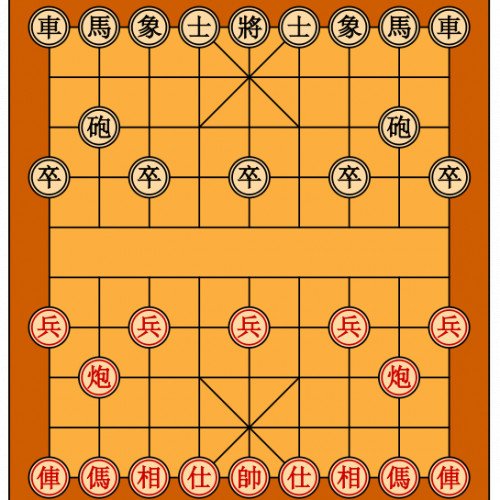DICEBALL VS XIANGQI

DICEBALL
Diceball! is a board game in which two players roll dice to simulate a baseball game, one representing the visiting team and the other the home team. Both players use the dice to throw the baseball from the mound to the plate and field the ball on defense. Diceball! was designed to mirror the statistical reality of baseball. A regular game of Diceball! without extra innings lasts about 45 minutes. The game was designed in 1979 on a pizza box by a 16-year old Daniel Girard from Rawdon, Québec, while the Montreal Expos were chasing the pennant in the National League. Girard brought his game to his high school, where he organized tournaments with other students. Given the popularity of the game in his school, Girard also brought his game to university where it also became popular. The interest created by the game was noticed by entrepreneur Louis Desjardins, who launched the game with Girard. To start the game, the visiting team puts a pawn (as a batter and eventually runner) in the batter's box, to get the pitcher's throws. The die replaces the ball. The pitcher rolls the die until either the batter is struck out, the batter is walked, or the ball is hit. If the ball is hit, the offensive team rolls a die to determine the number of dice to be used to hit the ball. The number of dice indicated are rolled and added up. Numbers from 1 to 36 show the location where the ball is hit and the ball is placed on the game board. If the ball is hit on a circle, the ball was hit in the air and an out is recorded. If the ball is hit on a number in a cloud, it is a ground ball and that the batter will have to try to reach a base before the defense throws to that base. If the ball is hit to a star-shaped zone, the runner starts to run around the bases while the defence recovers the ball on the star. If the stars are from 27 to 36 it is a home run and all runners score. Every batter who runs around the bases and reaches home plate before three outs scores a run. As soon as three outs are recorded, stranded runners are removed from the bases. The teams trade places: the defense becomes the offense.
Statistics for this Xoptio

XIANGQI
Xiangqi (Chinese: 象棋; pinyin: xiàngqí; Wade–Giles: Hsiang ch'i; English: /ˈʃɑːŋtʃi/), also called Chinese chess or Elephant chess, is a strategy board game for two players. It is one of the most popular board games in China, and is in the same family as Western chess, chaturanga, shogi, Indian chess and janggi. Besides China and areas with significant ethnic Chinese communities, xiangqi is also a popular pastime in Vietnam, where it is known as cờ tướng. The game represents a battle between two armies, with the object of capturing the enemy's general (king). Distinctive features of xiangqi include the cannon (pao), which must jump to capture; a rule prohibiting the generals from facing each other directly; areas on the board called the river and palace, which restrict the movement of some pieces (but enhance that of others); and placement of the pieces on the intersections of the board lines, rather than within the squares. Xiangqi is played on a board nine lines wide and ten lines long. As in the game Go (圍碁; or Wei ch'i 圍棋), the pieces are placed on the intersections, which are known as points. The vertical lines are known as files (Chinese: 路; pinyin: lù; "road"), and the horizontal lines are known as ranks (Chinese: 線/綫; pinyin: xiàn; "line"). Centred at the first to third and eighth to tenth ranks of the board are two zones, each three points by three points, demarcated by two diagonal lines connecting opposite corners and intersecting at the centre point. Each of these areas is known as 宮 About this soundgōng, a castle. Dividing the two opposing sides, between the fifth and sixth ranks, is 河 hé, the "river". The river is often marked with the phrases 楚河 About this soundchǔ hé, meaning "River of the Chu ", and 漢界 About this soundhàn jiè, meaning "Border of the Han", a reference to the Chu–Han War. Although the river (or Hanchu boundary) provides a visual division between the two sides, only two pieces are affected by its presence: soldiers have an enhanced move after crossing the river, and elephants cannot cross it. The starting points of the soldiers and cannons are usually, but not always, marked with small crosses.